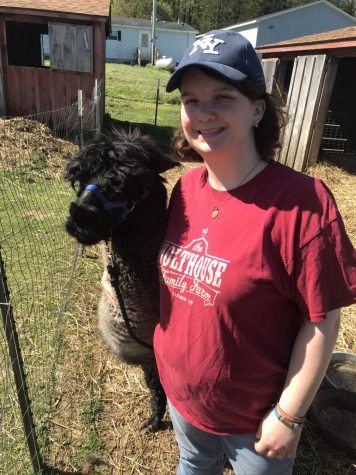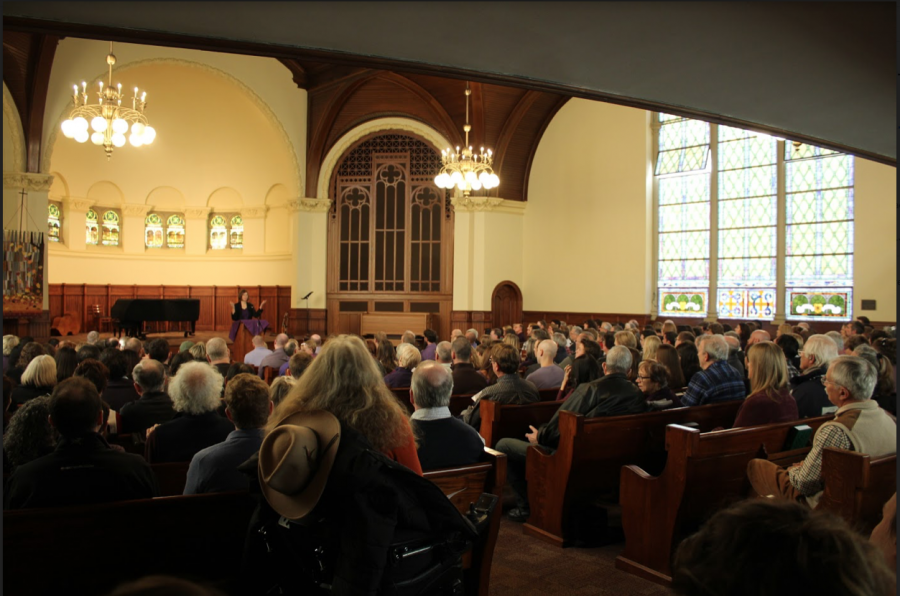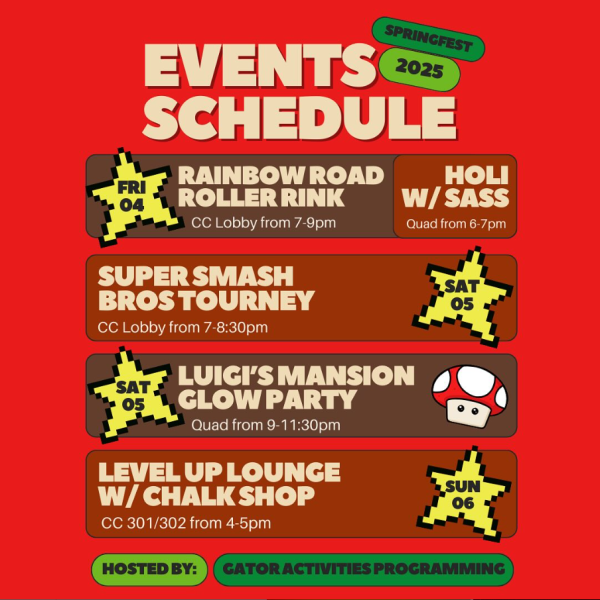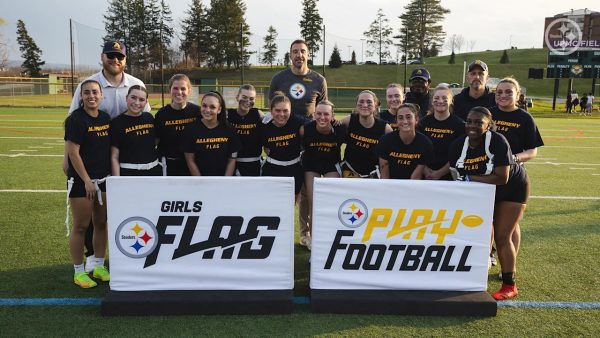Community, friends, and family gather to remember Wissinger
Friends, family and the Allegheny community fill the room to remember the life of Professor Emeritus Scott Wissinger at 11 a.m. on Saturday, Nov. 9, 2019, in Ford Memorial Chapel.
No one knows the full extent of the legacy they will leave behind or the number of lives that they touched while on Earth. For Professor Emeritus of Biology and Environmental Science Scott Wissinger, that amount is larger than a forest.
The campus community, along with friends and family of Wissinger, gathered for a Celebration of Life ceremony at 11 a.m. Saturday, Nov. 9, in Ford Memorial Chapel. Wissinger passed away on Oct. 5, 2019.
Ford Memorial Chapel was packed during the celebration of life — community members filled the main floor and extra chairs had to be brought out to accompany all the attendees.
After everyone had found a seat, the celebration began with an introduction by Jane Ellen Nickell, chaplain of Allegheny College.
“I’m glad so many people have gathered here,” Nickell said.
“We are gathered here for a time of remembering and celebrating the life of Scott Wissinger. All of us were shocked and saddened by Scott’s unexpected death last month. We gather with heavy hearts still trying to comprehend the enormity of that loss. As we planned this gathering, Sue (Wissinger) was very clear that our time together should be a celebration; a time to celebrate the life that Scott lived and the impact he made on so many people.”
Nickell added that friends, family and Wissinger’s former students had traveled across the United States to celebrate Wissinger’s life. Nickell thanked those in attendance and those who helped with the planning and setting up of the event.
After Nickell’s introduction, the first person to speak was Assistant Professor of Biology Matt Venesky.
Venesky shared a story of when he came to interview for a faculty position at Allegheny and was headed back to Tampa, Florida, when he ran into Wissinger at the Pittsburgh International Airport.
“As I was sitting on a bench at the airport, I called a friend of mine who was also on the job market, so we could chat about my interview,” Venesky said. “One ring, a second ring, and then there was a voice behind my right shoulder. ‘If you think about community organization and the palm permanency grading, I bet you could construct a model to predict why pathogen delusion might be permanent.’ And there sat Scott Wissinger.”
Venesky explained that Wissinger was also headed to Florida to visit his mother. The two ended up sitting on the same flight, one row apart from each other.
“Turns out we didn’t talk much about research or Allegheny,” Venesky said. “Instead, we talked about the Pittsburgh Pirates. … The Pirates had just completed their 20th consecutive losing season, and only a couple of weirdos would spend an afternoon of their own choosing, talking about the Pirates.”
Venesky said that conversation was the beginning of a friendship that would continue for the next six years. He then described a trip he took with Wissinger to the Bousson Environmental Research Reserve.
“As was typical with Scott, we left campus late and made two unscheduled stops on the way,” Venesky said. “Our first location was South Marsh, not so he could show me the pond, but so he could show me the row of blueberry bushes that lined the southern border of the property. … Scott was a true naturalist. He seemed to know every little detail about Bousson. His view of the environment was shaped literally from the ground up.”
Next, Venesky talked about Wissinger’s salamander project which focused specifically on spotted salamanders, beginning in March and concluding in April of 2013, “the busiest possible time of the academic year at Allegheny.”
“During these weeks, Scott and his students would collect and process anywhere between 500 and 1200 spotted salamanders as they migrated on cold and rainy spring evenings from forests and hillsides to a series of six ponds that he created shortly after arriving at Allegheny,” Venesky said.
Venesky described how during these weeks Wissinger would make, give and grade final exams and then fly to Colorado for the start of the summer research season.
“(Wissinger) managed this exactly how you might think, with controlled chaos,” Venesky said.
Additionally, Venesky said he and his students helped with the project every year as much as they could, which often included finding a fake salamander among the pile of real salamanders.
“This was a trick (Wissinger) pulled off seamlessly every year in the midst of all of the chaos,” Venesky said.
Venesky closed his remarks with a confession.
“This will come as no surprise to my biology colleagues nor would it surprise Scott,” Venesky said. “Scott, it was me who walked through every classroom and lab of Steffee Hall (of Life Sciences) one evening and collected the 17 overhead projectors and placed them around your desk causing you to be late for a Monday meeting.”
After Venesky, Donna Wissinger, one of Wissinger’s five sisters, played a selection from Antonio Vivaldi’s “The Four Seasons,” on the flute.
The next to share a memory was Professor of Biological Sciences at Murray State University Howard Whiteman, ’88.
Whiteman began by sharing thoughts from Wissinger’s Ph.D. adviser, and then moved into his own memories.
“It’s an honor to be speaking to you today about one of my closest friends and mentors,” Whiteman said. “But it’s an honor that I’d never wish upon myself. As wonderful as it is for us to celebrate Scott’s life and impact, every one of us knows this is the last place we thought we’d be on this November day. We all ache to be somewhere else, knowing Scott still lives. But many of you also know as well as I do that he’s not gone. He’s still in our hearts, and still in our brains. I’ve been trying to get him out of my head since I met him.”
After thanking Wissinger’s family, Whiteman spoke of his experience as an ecologist.
“Scott was an ecologist, and all ecologists understand life history,” Whiteman said. “We are born, we live, we die. Scott lived a tremendous life. We all cherish the memories we made with him, and will never let go of them. Like many of you, my heart and soul have been torn to pieces by Scott’s death. And even more so because he died with so much left to give.”
Whiteman added that everyone felt loss that was “greater than just a single life.”
“It’s like an entire epic of human existence has suddenly ended,” Whiteman said.
Whiteman began his memories of Wissinger by talking about Wissinger’s numerous sabbaticals and traveling around the world, including his travels to New Zealand. He then discussed Wissinger’s love of trees.
“As many of you know, Scott loved to plant trees,” Whiteman said. “But he didn’t just plant and care for (these trees). He planted all of his former students as well. Some of us are older and some of us are saplings, but we were all nurtured the same. … (He gave us) life through education, and a lot of weeding through his conversations.”
According to Whiteman some of Wissinger’s “saplings” have grown to have their own and have given Wissinger his own academic grandchildren and great grandchildren.
“So the forest of science that Scott created is vast,” Whiteman said. “And it continues to grow. Our forest guardian may be gone, but we should take comfort in the fact that everyday more and more saplings are added to his forest.”
Whiteman described how, one day, he decided that he wanted to be more like Wissinger, except he wanted to sleep more — adding that he also wanted to have hair like Wissinger.
“One of (Wissinger’s) favorite sayings was ‘work hard, play hard,’” Whiteman said. “And I cannot think that there is any better advice in the entire world than that. I try to follow his lead.”
Whiteman ended his remarks by saying that everyone who knew him had a special connection with Wissinger.
“Life will go on, but there is a missing part of the academic web, one that simply cannot be replaced” Whiteman said. “And the sadness that comes with that is difficult to bear. But bear it we will, and keep on living, not just existing. Some of us will plant more trees in the forest that he started. But we will all work hard and play hard and enjoy every last second of life, just like Scott.”
Next to offer remarks was Professor Emeritus of Biology Milt Ostrofsky.
Ostrofsky began his time with a story of how he and Wissinger used to share an office before the Biology Department was moved to Steffee Hall, and since then they would get together a couple times a month.
“Scott was a sunny idealist, and I was a cynical pragmatist,” Ostrofsky said. “I’m sure you’re all familiar with the tremendous contributions Scott made to the college. However he did claim, on numerous occasions, that his view of hell was sitting inside a meeting on a sunny day when he could be outside doing fieldwork.”
Ostrofsky turned again to Wissinger’s love of trees, calling it a “tree fetish.” Ostrofsky described how Wissinger often left fundraisers with hundreds of trees and his goal of having every tree species native to Pennsylvania on his land.
“There was one time (Wissinger) came into my office, beaming like a kid at Christmas,” Ostrofsky said. “He said ‘I found one.’ And I said, ‘Found what?’ ‘Mockernut Hickory,’ (he said).”
According to Ostrofsky, Wissinger had been out the night before digging up saplings across from the Saegertown Fisher Ludlow, a “private but unidentifiably owned land.”
Ostrofsky then turned his story to an opening at Florida International University, for students getting their Master’s Degree. He described how the University accepted one student who had completed their Senior Comprehensive Project under Wissinger, and then requested five more who were all working on their comps under Ostrofsky and Wissinger.
In 2005, Ostrofsky and Wissinger were invited to go down to the University to celebrate the 10-year graduating anniversary of the students who had comped under Wissinger and Ostrofsky. According to Ostrofsky, he and Wissinger wore the wrong shoes to the event, and ended up with their feet all wet. Students helped them to find shoes, but for Ostrofsky they were too small, and for Wissinger too large. According to Ostrofsky when they went to meet the people who had invited them down there and “had heard so much about these two people who these students had comped under,” they looked a little bit ridiculous.
“We made quite the impression,” Ostrofsky said.
Ostrofsky added the differences and similarities in things that interested him and Wissinger over the years, which included concepts of time.
“It always amused me that someone so attentive to small increments of time could be so inattentive to large increments of time,” Ostrofsky said. “Scott always ran late. … If you ever served on a committee with Scott or went to his office hours you always knew he would be late because he got distracted by something, or tempted, or forgotten entirely. The upside was … no matter how late you were, you were never the last one.”
Ostrofsky ended his talk by saying how he still looks to see if Wissinger’s office door is open so he can walk in and chat with him.
Following Ostrofsky, Ron Mumme, professor of biology, and Sam Reese, lab technician in the Geology and Environmental Science Departments, performed “Three Little Birds” by Bob Marley.
The final remarks were made by Professor Emeritus of English James Bulman, who also read remarks from Professor of Theatre and Communication Arts Beth Watkins.
Bulman began with remarks from Watkins, which included the story of how Wissinger was sad that he let the love of his life, Sue Wissinger, get away after high school.
However, the two of them ended up married and as neighbors to Watkins. The two of them also had constant impromptu visits to Watkins’s house.
“‘He was a loyal friend, faithfully kind, … and always, always late,’” Bulman read. “‘On weekends Scott would ski over to our house, and our daughters would yell ‘neighbors are here.’ And we’d yell back, ‘well, invite neighbors in.’”
Additionally, Bulman described the multiple stories and visits that Wissinger had with the family, including being one of the only ones brave enough to set out democratic signs during voting season.
Bulman then added in some of his own memories, including a time where both he and Wissinger went on a college sponsored trip to Israel and ended up being roommates.
“It seems I kept Scott awake with my snoring,” Bulman said. “By the last night he persuaded me to be tested for sleep apnea. It turns out he was right. I sleep more quietly now thanks to Scott.”
Bulman then told stories of Wissinger’s love of practical jokes, including a story of how one night on New Year’s Eve when he went to get wine out of his car he found a deer carcass instead, put there by Wissinger.
“Scott had picked up the carcass on the side of the road, and brought it over in his truck to be a little New Year’s surprise,” Bulman said. “I can’t describe the delight on his face when I reentered the house and asked where he’d hidden the wine. But revenge is sweet. By the end of the night those haunches had passed back and forth between his truck and mine so often that the deer walked away in protest, and right into the back of Milt Ostrofsky’s car.”
Bulman next described the days when Wissinger’s son, AJ, was not around for the new year and he and Wissinger would call him at midnight, even if it was 5 a.m. where AJ was.
“No matter what the hour though, AJ sounded in better shape than we were,” Bulman said.
Bulman described the enormous pride Wissinger had in AJ, and how excited he was to spend time with his granddaughter who had been born over the summer.
“Scott instantly fell in love with his new granddaughter, Charlotte, and looked forward to doing with her all of the things that he had done with AJ,” Bulman said.
Bulman ended with his last memory of Scott at the “president’s party in August.”
“He was showing everyone around him pictures of Charlotte on his phone,” Bulman said. “Through the treasure trove of stories, and photos shared by family and friends, Scott will still always be a part of Charlotte’s life, as he will be in ours.”
Nickell returned to the podium to offer closing remarks. She invited the audience to the reception at Schultz Hall that followed the celebration. Nickell also invited them to take a purple pin in the back if someone had come not wearing purple. Those attending had been welcomed to wear purple as purple was “Scott’s favorite color.” Additionally, Nickell welcomed the audience to fill out a form that was passed around, which was meant to get people to plant trees to help continue to build the forest that Wissinger left behind. The forms will be used to create a website in honor of Wissinger. Nickell then closed by reading a poem by Wendell Berry.
“‘When despair rose in me, and I wake in the night at the least sound, in fear of what my life and my children’s lives may be, I go and lay down where the wood drake rests in its beauty on the water,’” Nickell read. “‘For a time I rest in the grace of the world and am free.’”
Nickell reminded the audience once again that Wissinger lives on in those who remain behind.
“So when you fall into grief, as you will, follow Scott’s example and find your way into nature,” Nickell said. “Seek the presence of still water. Come into the peace of wild things, where you can rest in the grace of the world and be free.”

Sara Holthouse is a senior from Panama, NY. This is her third year/final semester on staff, where she has previously served as news editor for the past...









